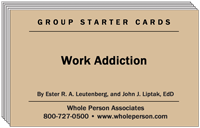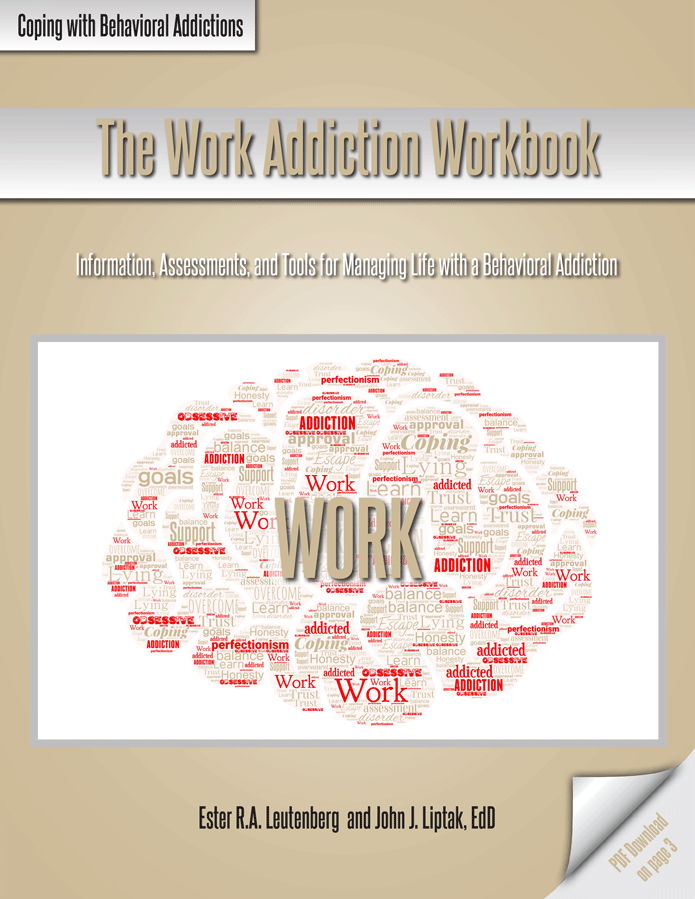Work Addiction
The Work Addiction Workbook provides helping professionals with cognitive and behavioral assessments, tools, and exercises that can be utilized to treat the root causes of work addiction and to help people identify and change negative, unhealthy thoughts and behaviors that may have led to work addiction.
The activities in this workbook can assist participants in identifying their work addiction triggers and teach them ways to overcome and manage those triggers. This workbook can help participants to achieve the following:
- Become aware and recognize that they are experiencing an addiction problem.
- Realize and reflect on the behaviors that were part of, and arose from, the addiction.
- Build self-esteem in positive aspects of their personality and non-work-related skills.
- Recognize the triggers of preoccupation with various aspects of working behavior.
- Develop greater self-acceptance and the ability to change ineffective behaviors.
- Understand recurring patterns that indicate an addiction to work.
- Learn ways to live a new life without the need to obsess about working.
The Work Addiction Workbook is a practical tool for teachers, counselors, and helping professionals in their work with people suffering from work addictions. Depending on the person’s role using this workbook and the specific group or individual needs, the modules can be used individually or as part of an integrated curriculum. The facilitator can administer an activity with a group or individual or use multiple assessments in a workshop.
Work Addiction Modules
This workbook contains five modules of activity-based handouts that will help participants learn more about themselves and their addiction to work. These modules serve as avenues for self-reflection and group experiences revolving around topics of importance in the participants’ lives.
The activities in this workbook are user-friendly and varied to provide a comprehensive way of analyzing, strengthening, and developing characteristics, skills, and attitudes for overcoming an addiction to work.
The activities and handouts in this workbook are reproducible. Minor revisions to suite client or group needs are permitted, but the copyright statement must be retained.
Module 1: Psychological Need
This module helps participants become aware of and explore the psychological issues that drive them to need to work all the time. They examine how their obsession with work causes problems, including damaged relationships, health problems, and an inability to slow down and enjoy life outside of work. They learn methods to manage psychological needs driving them to overwork, such as low self-esteem, work as a coping mechanism, and approval-seeking behavior.
Module 2: My Work Patterns
This module helps participants explore and recognize the patterns that lead to a
work-related problem. They examine how they live in denial and do not see how their overworking patterns affect them and the people in their lives. They endeavor to become aware of their overworking patterns and how these patterns are often the starting point of their recovery.
Module 3: I Have a Problem
This module helps participants examine how their work addiction is a maladaptive pattern of excessive behavior that manifests in physiological, psychological, and cognitive symptoms. Participants discuss how their addiction encompasses the same symptoms as someone addicted to a substance. Exercises are included to help them examine the extent of their work addiction.
Module 4: Maintain Wellness
This module helps participants realize they are at risk of burning out because of their work addiction unless they maintain a sense of wellness. They examine their emotional, physical, and mental exhaustion caused by excessive and prolonged work stress. Activities are included to help them feel less overwhelmed and emotionally drained and to build the ability to cope with the stress of life.
Module 5: Work-Life Balance
This module helps participants overcome an imbalance between their work and other life roles, such as their personal and family life. They will examine ways to develop a better work-life balance to split their time and energy between work and other vital aspects of life. They will learn tools and techniques for balancing work and life.
 Work Addiction Card Deck
Work Addiction Card Deck
Using the Discussion Starter Card Deck will break the ice, encourage openness, and help introduce a specific subject. Activity handouts included in these workbooks are reflective, easy-to-use exercises, presented in a variety of formats to accommodate multiple intelligences and different learning styles. Each question corresponds to a page in the workbook.


